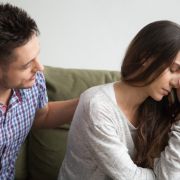在我處理的個案中,有不少核心情緒和過度的内疚guilt和自卑(shame)有關 - Ill guilt - 病態内疚和自卑。
母親的内疚
1病太内疚的產生源頭
以下這篇文章,讓我們看到一個孩子是如何被封閉式的家庭教育折磨,千方百計用内疚去please父母吵架,不離婚,最後内疚過度變成精神病-(情緒病是精神病)
一個精神病的孩子是怎樣“煉成的”?- 媽媽的自白
https://www.donnadreamhypnosis.com/2022/01/blog-post_18.html
如何克服内疚
https://www.donnadreamhypnosis.com/2022/03/blog-post_59.html
從中讓我們明白到惡性内疚 (negative guilt) 是如何形成,如何走出害人害己的内疚。
2
我的故事:
母親,自己的媽媽 (donnadreamhypnosis.com)
家長的煩惱 - “應該做得到,爲什麽不做?”
内疚如同糯米糍
你開始明白到內疚,缺乏安全感和自信心,一部分來自媽媽以前負面的情緒、她的苦難和家族影響,一方面來至學校的欺凌。這些都過去了!你明白了自己還不時用過去的陰影、限制性的信念鞭打今天的自己。又一次次產生新的傷害,令脆弱的心靈備受煎熬。而這些東西還一直牽繞著自己,影響自己,少了心靈的力量面對當下很多挑戰,如經濟上的挑戰,患精神病的奶奶的挑戰。
特別是對女兒的內疚,對自己的內疚 ( 不夠好)和先生的內疚( 投射情緒在他身上),有些和當年媽媽的内疚,或她一直都沒有放下的内疚類似,而這些内疚纏繞著你,都對自己身體造成壓力和身心症狀出現。
我帶你思考這些限制性的信念背後有什麽好處和害處。如果用一個東西來形容內疚,是什麽?你的比喻令我驚喜 - 糯米糍 粘住你不放,一部分是你自己都不想放下它!你有時覺得需要她,令你舒服一些,否則自己會更辛苦,這就是ill attachment issue。
Yes, 這也是糯米糍存在的原因。但你也看到她的更大的價值 ( 最amazing的地方:是提醒你自己的脆弱,自己不愛自己,看到自己有進步的空間...我引导你看到內疚會產生一系列的愤怒情緒,受害三角陷阱- 拯救者、受害者,加害者,惡性循環,真的是一個死胡同!
我問你這些内疚的情緒,自我批判,對自己的身體有什麽影響:如頭疼,失眠,關節痛,心悶或痛,血壓升高,或敏感症狀,是的,你說說:起暗瘡,疼痛,、失眠等,這些都是身心症狀,情緒導致免疫力下降。
如何不被情緒困擾?
走出情緒三角陷阱 Drama Triangle - 陰影的覺察與療愈
What Are Secondary Gains?
What is survivor’s guilt?
Survivor’s guilt (or survivor guilt) is an emotional experience that results from being relatively unharmed by a situation, compared to others. When one emerges from an accident or a conflict alive while others have died, for example, that person may experience survivor’s guilt—despite not being responsible for the others’ deaths.
Guilt is aversive and—like shame, embarrassment, or pride—has been described as a self-conscious emotion, involving reflection on oneself. People may feel guilt for a variety of reasons, including acts they have committed (or think that they committed), a failure to do something they should have done, or thoughts that they think are morally wrong.
Contents
What Is Guilt?

When one causes harm to another, guilt is a natural emotional response. Guilt is self-focused but also highly socially relevant: It’s thought to serve important interpersonal functions by, for example, encouraging the repair of valuable relationships and discouraging acts that could damage them. But in excess, guilt may needlessly burden those who experience it.
Can guilt be helpful?
Given how uncomfortable guilt can feel, it can provide a strong motivation to apologize, correct or make up for a wrong, and behave responsibly. Since doing so helps preserve social bonds and avoid harm to others, guilt, despite being a “negative” feeling, can sometimes be good. Research suggests that guilt-proneness may be related to empathy as well as trustworthiness.
Does everyone feel guilt?
Not necessarily. The degree to which people feel guilt varies, and those with certain personalities may experience relatively little (if any) guilt. A lack of guilt and remorse is one characteristic that experts have used to diagnose psychopathy.
What is the difference between guilt and shame?
Are some people prone to guilt and shame?
When do children begin to feel guilt?
What is survivor’s guilt?
How to Cope With Guilt

Feeling guilt after a misdeed is normal and can often be remedied by apologizing and taking steps to make up for whatever pain or offense has been caused. But many feel guilt that is out of proportion to the harm they have caused, or even disconnected from any real harm. In such cases, it may be necessary to reflect on the reasons for one’s feelings of guilt—perhaps in conversation with a counselor or therapist, especially when an underlying mental health condition may be involved.
Why do I feel guilty about everything?
Though pervasive feelings of guilt are not necessarily a sign of an underlying mental health condition, they can be. Widely used criteria include regular feelings of “excessive or inappropriate guilt” among the symptoms of major depressive disorder and bipolar disorder, and guilt plays a role in other disorders as well. The guilt may be related to repeatedly thinking about minor failures or stem from things that are not actually within a person’s control.
Can you feel guilty for something that isn’t your fault?
Yes. Someone may feel survivor guilt despite bearing no responsibility for circumstances that have harmed others. People with certain kinds of mental illness may feel unwarranted guilt as part of their condition—such as guilt for “bad” intrusive thoughts, in the case of obsessive compulsive disorder (OCD).
What are some ways to feel less guilt?
Can therapy help with guilt?
Yes. Given that guilt can be excessive or undeserved and that guilt can be an aspect of some mental health conditions, therapy can be helpful for addressing intense guilt. There are evidence-supported treatments for depression, for post-traumatic stress disorder, and for other conditions that involve pronounced feelings of guilt (though therapy may be helpful even in the absence of a diagnosed condition).
What are some ways to deal with a “guilt trip”?
When someone tries to instill guilt to get another to behave a certain way—an act often associated with mothers and their children—responding with empathy, while also setting limits when necessary, could help in getting out of the guilt trip. That may include acknowledging the importance of what the guilt-tripping person wants while also asking them to express their wants directly and to respect your decisions.



No comments:
Post a Comment